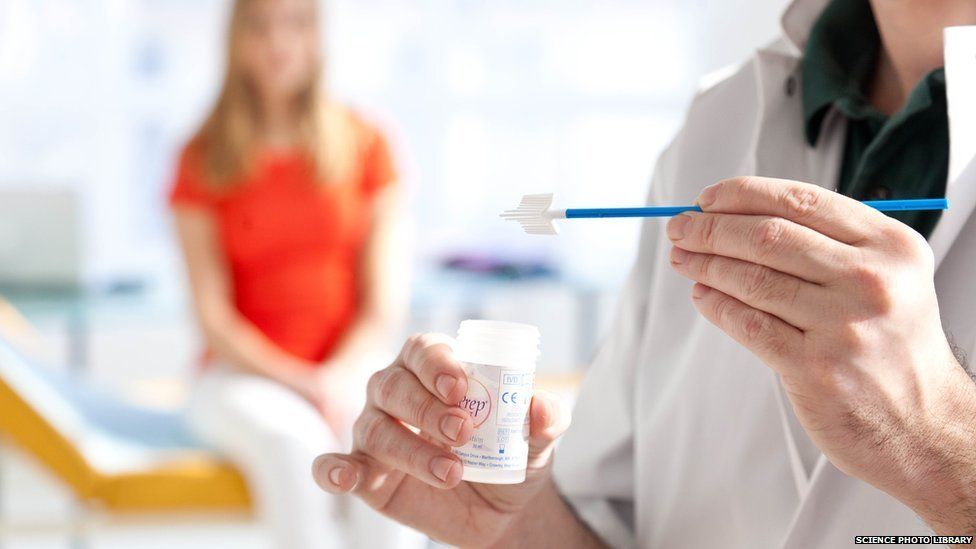ARTICLE AD BOX
 Image source, Science Photo Library
Image source, Science Photo Library
Smear tests check the health of the cervix
By Marie-Louise Connolly and Catherine Smyth
BBC News NI Health desk
A woman who has been diagnosed with cervical cancer has learned that she had three previous abnormal smear tests that were missed.
Susan, not her real name, had to undergo a radical hysterectomy when a test in 2019 revealed cancerous cells.
The 45-year-old said she was devastated at the diagnosis and shocked and upset that previous tests had been misread.
The Southern and Western trusts, which were involved in Susan's care, have apologised.
After hearing Susan's story, BBC News NI found that the Southern Health Trust (SHT) is beginning a review or risk assessment, which will be carried out by the Royal College of Pathology.
The review is expected to take 10 weeks to complete and could affect hundreds of women.
The woman spoke anonymously to BBC News NI health correspondent Marie-Louise Connolly
It will attempt to establish if there was a greater chance of missing abnormalities in screening samples in the trust between 2019 and 2021.
The SHT has confirmed that "work involving a number of screening staff will be examined as part of the risk assessment".
What happened to Susan?
Susan said her world fell apart when, at 42, she was told she had cancer and needed a hysterectomy.
"I was plunged into the menopause and dealing with that was horrendous. It affected me physically, mentally and emotionally," she said.
While Susan was getting back on her feet she was asked by the Western trust if she would like to come in for a review of her case history.
Susan described what followed as "totally shocking and devastating".
"They told me that, not only did they miss one smear test, they missed three over 10 years.
Getty
Cervical cancer in NI
2016-2020
81 cases annually(On average)
21 deaths annually(On average)
Source: NI Cancer Registry
"You put your trust in the medical profession, the people that are supposed to analyse these smear tests. You put your trust in them and somebody didn't do their job properly."
BBC News NI discovered the Southern Health Trust misread Susan's smear test result in 2011 while the Western Health Trust missed abnormal cells in tests in 2014 and 2017.
A Serious Adverse Incident (SAI) was launched after she asked both trusts to investigate.
It concluded if test results "had been correctly identified as abnormal the management advice for the patient would have been different and would have resulted in a direct referral for colposcopy".
What is cervical screening?
It aims to prevent cervical cancer - by identifying and treating abnormalities that could develop into cancer if left untreated.
What happens during a smear test?
But screening cannot identify every single case of cancer or pre-cancer - it is not a diagnostic test for cancer.
Why is this happening now?
Susan said she has told her story to alert other women - and that she's met others in a similar position.
It comes as all of Northern Ireland's health trusts are carrying out reviews of cervical cancer cases going back a number of years - some are probing as far back as 2008.
This was prompted by two developments:
- First, new guidelines issued by the Public Health Agency (PHA) in 2019, which advised trusts on how to communicates the results of audit outcomes and reviews.
- Secondly, the 2018 inquiry in the Republic of Ireland into the cervical smear crisis also prompted local trusts to examine more closely what patients were told.
Susan said what women did in the Republic had a massive impact as "without those women making a noise and getting things put in place", the audits in Northern Ireland may not have happened.
What do the reviews say?
Figures obtained by BBC News NI, via Freedom of Information requests from all the health trusts, indicate there were serious issues with at least nine of the 227 cervical cancer diagnoses across Northern Ireland in the three years up to 2021.
In 2020 in the Western Health Trust, of the 10 women who had received a cervical cancer diagnosis, half of them, including Susan, had the most serious category three findings.
Not all women have been informed of the review process.
Analysis: Speaking out and raising awareness
It takes a great deal of courage to talk publicly about a personal trauma - it also requires courage to take on a health trust.
By doing both, Susan has made women aware of the 2019 cervical audit and their right to be informed of personal data including misread smear results.
As Susan told me, women must be encouraged to come forward to receive it via billboards and public discussion.
The 2019 Audit of Invasive Cervical Cancers and Disclosure of Findings asked trusts to take forward duty of candour in relation to findings.
According to Susan, while she was informed of the misread results she had to fight for a Serious Adverse Incident review into her case.
Thanks to Susan, we are now more aware of our right to disclosure of results.
Other places have taken this further.
Following his review of the cervical crisis in the Republic, Dr Gabriel Scally said "open disclosure should be mandatory".
The then Taoiseach Micheál Martin said to protect women's health there was a need for legislation and cultural change.
BBC News NI can reveal that not all women affected have been told of the 2019 audit and subsequent review of their personal records.
The way figures are handled varies across the trusts, as does the way information is shared with patients.
For instance, the Western Trust said it would like to "inform women between 2008 - 16 of the audit review but they have limited specialist staff" - whereas some women in the Southern Trust have been informed of audit review.
It is understood there is a massive backlog of cervical smear tests which have yet to be checked across all of the health trusts - this is due to a shortage of specialist staff.
The PHA said it was "assured that all trusts have operationalised the framework guidance that was issued in 2019" - and all the trusts, except the South Eastern, said they were satisfied that the guidance had been implemented.
The PHA added the timing of disclosure [of previous diagnoses] would be dependent on an individual woman's treatment journey and personal choice.
Dr Brid Farrell, from the PHA, said every year in Northern Ireland about 80 women are diagnosed with cervical cancer, with approximately 110,000 women getting the test.
She added that the cervical screening programme is effective at reducing the number of cases in Northern Ireland.
However, she said, there were "occasions when we get what we call a false negative and we will have missed a case, and it's really important that we learn from cases like this so that we can improve our screening programme".
The PHA advised the Southern Health trust to bring in the Royal College of Pathologists to conduct a review of the Southern Trust's screening programme.
Dr Farrell confirmed to BBC News NI the PHA was putting a plan in place to try and address the backlog of screening cases and get back to where the system was pre-pandemic.
What have the trusts done?
Western Trust: It decided to inform women in 2017 and 2018 that an audit was taking place regarding their smear tests.
That followed a recommendation from the hyponatraemia report about trusts being open and transparent.
It is now reviewing all cases between 2008-2019 and will "endeavour to complete initial contact with patients by the end of 2023".
Southern Trust: Between 2008 and 2018, 161 women were diagnosed with cervical cancer.
Fewer than five of those women in each year have been informed of the ongoing review into their smear tests.
Following a review, the tests of at least 27 women, were not consistent with their most recent result.
The Southern trust said the audit process for patients from 2020/21 onwards has been "delayed in response to a request from the PHA to have the smear tests of these women externally reviewed".
Both the Western and Southern Trusts have said they are applying recommendations from the investigation.
Belfast Trust: Before 2014 "audit review activity was intermittent", said the trust.
Since 2019, 64 women were diagnosed with cervical cancer - fewer than five have so far received the outcome of their review.
South Eastern Trust: 44 women diagnosed with cervical cancer since 2019.
Fewer than five have been offered disclosure of any review outcomes, but the trust said the "process was ongoing".
Northern Trust: 37 women diagnosed since 2019. The trust said all women have been informed of reviews from 2014.
If you have been affected by any of the issues in this story, you can contact the BBC Action Line for support.

 2 years ago
66
2 years ago
66








 English (US) ·
English (US) ·